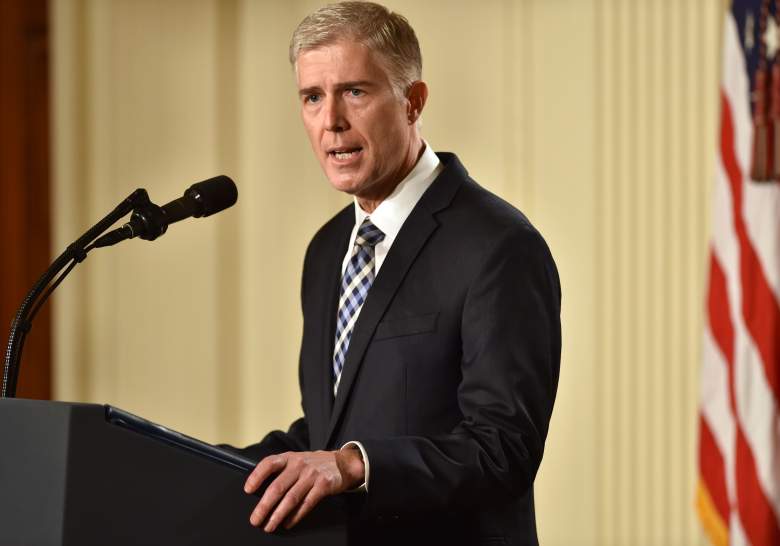President Donald Trump has nominated Neil Gorsuch as his choice for Supreme Court Justice. What are his views on cases involving the police? One can get an idea of Gorsuch’s views on police, due process, searches and traffic stops based on some of his past rulings.
Here’s what you need to know.
He Upheld Traffic Stop Patdowns, Mostly Worried About Brutality Against Police
In 2011, Gorsuch upheld traffic stop patdowns in U.S. vs. Rochin (read the full case here.) In the case, a three-judge panel looked at whether Office Joe Moreno was within the law when he searched a driver, Ivan Rochin, after pulling him over and discovering he had an expired registration. Rochin matched the description of someone wanted for a drive-by shooting, so he was ordered out of the car for a pat-down search. During the search, glass pipes containing drugs were discovered. The court ruled the search was reasonable under the Fourth Amendment.
Gorsuch acknowledge, in his opinion, that traffic stops can turn violent, but his focus was on the violence that police officers face. He wrote:
Not every traffic stop is so innocuous. Sometimes what begins innocently enough turns violent, often rapidly and unexpectedly. Every year, thousands of law enforcement officers are assaulted — and many are killed — in what seem at first to be routine stops for relatively minor traffic infractions.”
Gorsuch continued:
A reasonable officer could have concluded that the long and hard objects detected in Mr. Rochin’s pockets might be used as instruments of assault, particularly given that an effort to ask Mr. Rochin about the identity of the objects had proved fruitless. To be sure, the pipes Mr. Rochin turned out to have aren’t conventionally considered weapons. But a reasonable officer isn’t credited with x-ray vision and can’t be faulted for having failed to divine the true identity of the objects.”
He Upheld Disarming Citizens Before Determining If They Had a License to Carry a Gun
In a different case, in 2013, Gorsuch joined in an opinion in United States v. Rodriguez (you can read the case here.) In this case, a New Mexico policeman observed Rodriguez carrying a concealed handgun. In New Mexico, this is only legal if the person carrying the gun has a license. The officer detained Rodriguez first, disarmed him, and then asked questions. He subsequently found out that Rodriguez was a felon and placed him under arrest. Gorsuch did not write this opinion, but he also did not dissent in concluding the officer’s actions were warranted. When American Thinker reviewed this case, they concluded that detaining and disarming Rodriguez before determining if he carried the firearm legally might carry negative precedent. It could open the door for allowing police to forcibly disarm citizens who are legally carrying firearms, before asking if they have a license to carry.
He Doesn’t Always Rule on Law Enforcement’s Side
Gorsuch doesn’t always side with law enforcement, however. In U.S. v. Denson in 2014, he was concerned about law enforcement overstepping their boundaries when it came to using technology for “search and seizure” purposes. (Read the full case here.) In this case, law enforcement entered Denson’s property after using a handheld Doppler radar device to determine he was inside. The court ruled that the officers had probable cause to enter the home and find Denson, based on numerous factors. However, its use of the Doppler radar device was questionable.
The opinion stated:
It’s obvious to us and everyone else in this case that the government’s warrantless use of such a powerful tool to search inside homes poses grave Fourth Amendment questions. New technologies bring with them not only new opportunities for law enforcement to catch criminals, but also new risks for abuse and new ways to invade constitutional rights.”
And in a different case, he wrote that a homeowner revoked the law enforcement’s ability to enter his home or knock on the door, without urgent circumstances, simply by posting a no-trespassing sign. In his dissent, he wrote:
Our duty of fidelity to the law requires us to respect all these law enforcement tools. But it also requires us to respect the ancient rights of the people when law enforcement exceeds their limits. In this case the two arguments the government offers to justify its conduct can claim no basis in our constitutional tradition… And, respectfully, I just do not see the case for struggling so mightily to save the government’s cause with arguments of our own devise — especially when what arguments we are able to muster suffer so many problems of their own…”
He had some nicely sarcastic comments in his dissent too:
A homeowner may post as many No Trespassing signs as she wishes. She might add a wall or a medieval-style moat, too. Maybe razor wire and battlements and mantraps besides. Even that isn’t enough to revoke the state’s right to enter…. this line of reasoning seems to me difficult to reconcile with the Constitution of the founders’ design.”

